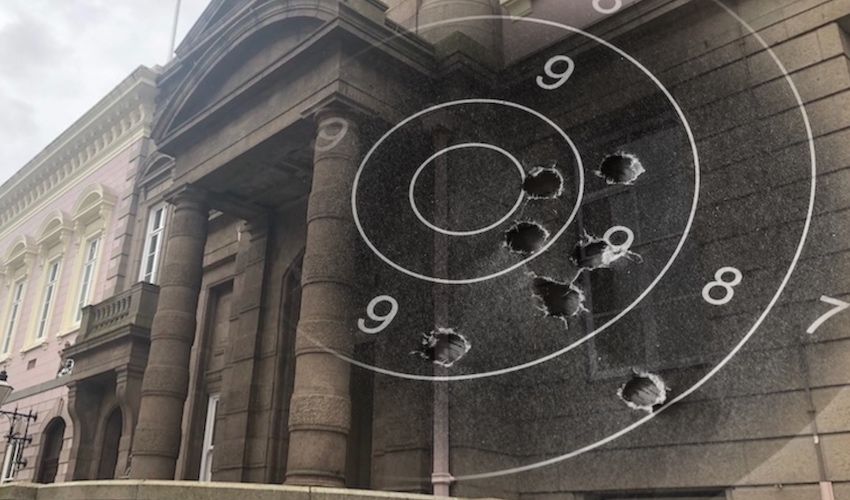

An ex-offender and keen shooter, whose decades-old conviction prohibits him from having a firearms licence, has asked Jersey's Royal Court to lift the ban before his health condition stops him being able to shoot altogether.
The first case of its kind in Jersey, Dr Martin Osment’s application has thrown up a legal quandary for the Court, which must now grapple with a “peculiar” section of the law.
Legal Adviser Advocate James Rondel, representing the Parish of St. Saviour – where Dr Osment resides and therefore the authority he would have to apply for his firearms licence – laid out the law for the Court last week in a case before the Deputy Bailiff Robert Macrae, presiding, and Jurats Paul Nicolle and Kim Averty.
Under the Jersey firearms law, any offender who has been sentenced to three years or more is automatically prohibited from owning a firearms licence.
The Court was told that, in 1986, Dr Osment was convicted, after trial, of seven offences under the Theft Act 1968. It led to a three-year prison sentence and a blanket firearms ban.

Pictured: Deputy Bailiff Robert MacRae was presiding over the case.
The law states that an individual can apply to the Royal Court to have this ban lifted, but only “once during each fifth year from the date” they were originally prohibited.
By this logic, a previous offender could only apply for their firearms ban to be lifted within a 12-month window every five years from the date it was put in place.
Describing this caveat as “peculiar”, Advocate Rondel explained that this aspect of the law appears to be designed to make it “more onerous” for those with convictions to get access to firearms.
The Legal Adviser provided the Court with a 1985 memo from the then Chief of Police to an individual involved in drafting the law, saying that it was the “express wish of the working party” tasked with working on this legislation that it “should be made more difficult for a prohibited person to have access to firearms".
The Court heard evidence from the current Firearms Registrar with the States of Jersey Police Jeremy Cauvain who was approached by Dr Osment in early 2019 regarding his application to have the prohibition lifted.
Mr Cauvain explained that Dr Osment, who lives between Jersey and Sussex, had informed him of his previous convictions, but advised that his UK firearms licence had been reinstated.
It later transpired, however, that prior to speaking with Mr Cauvain, Dr Osment had been casually shooting at the Jersey Pistol Club under the impression that his UK licence was sufficient for this purpose.

Pictured: The "peculiar" section of the law is being considered by the Royal Court.
It was heard that when filling in the form to shoot at the club in October 2018, Dr Osment had denied that he had any previous convictions and he also signed the declaration that he wasn’t prohibited from using a firearm either in Jersey or in any other jurisdiction.
Mr Cauvain remarked that shooting clubs’ ‘temporary memberships’ for those without valid firearms certificates are a “very grey area in that part of our legislation”, as there are “no vetting checks” for casual shooters at the range.
Answering questions from the Deputy Bailiff, Mr Cauvain said that, had Dr Osment filled in the form correctly, the club “would have been bound to refuse him access”.
Putting his case to the court, Dr Osment emphasised that his UK firearms certificate is “very generous” in allowing him “a wide range of firearms” and “considerable” quantities of ammunition.
He said this highlighted “the trust that is placed in [him]”. Responding to the allegation that he falsely filled in the pistol club form, Dr Osment offered his “abject apology for the mistake that [he] very clearly made”.
The keen shooter justified the way he filled in the form by saying that he was “under the understanding” that he didn’t need to declare his conviction because his firearms prohibition was lifted in the UK, but he added: “...The moment I became aware of the situation, I notified the Honorary Police.”
He continued: “I bitterly regret making that declaration knowing what I know now.”
Making his final plea to the Court, Dr Osment said that if the Jurats were to refuse his application he would not be able to apply for another five years and he could not be sure whether his health would allow him to shoot so far into the future.
The Court said they would hold off making a decision straight away so that they consider all elements of the case.
Comments
Comments on this story express the views of the commentator only, not Bailiwick Publishing. We are unable to guarantee the accuracy of any of those comments.